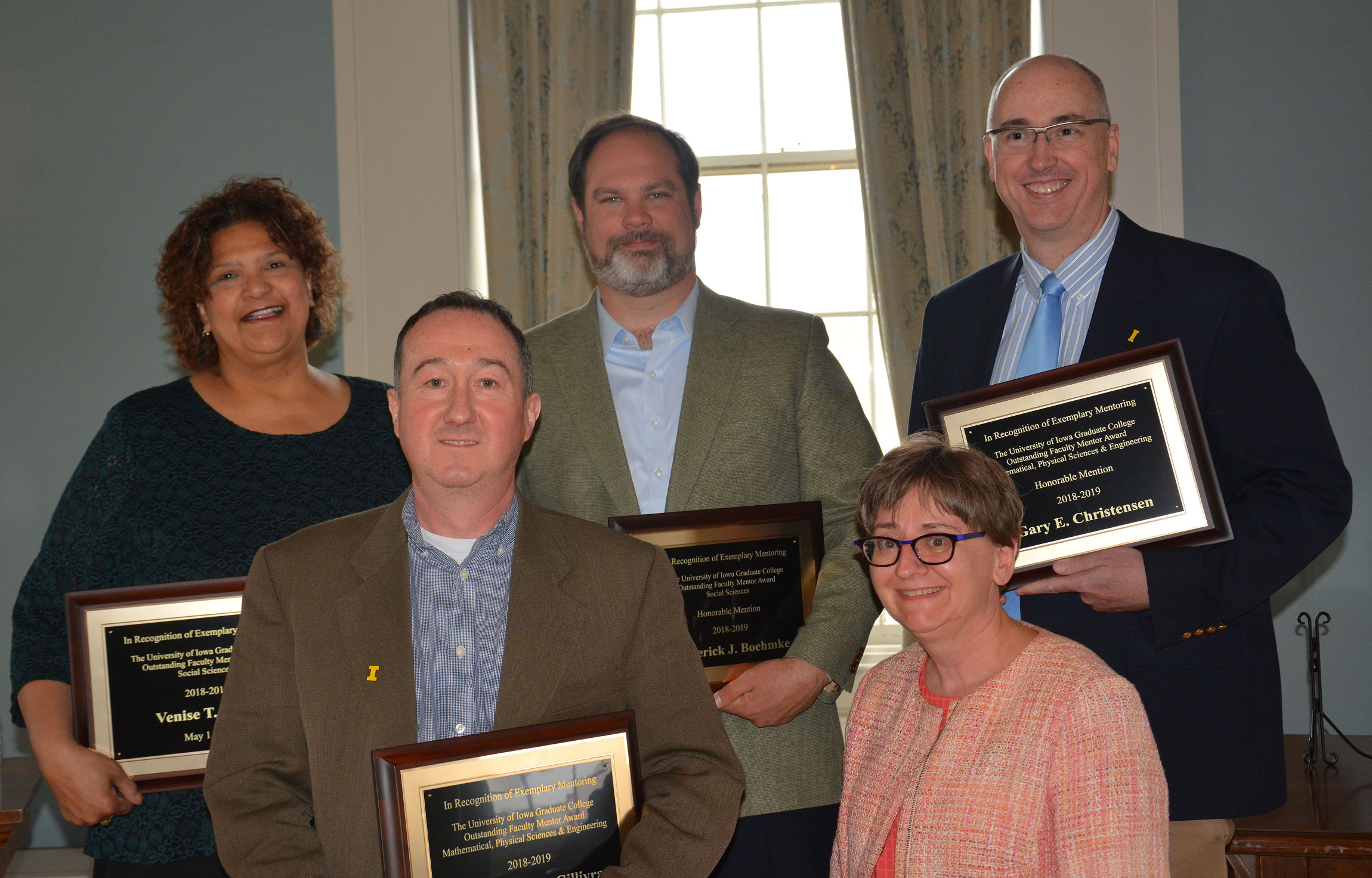
The Graduate College is pleased to honor Venise Berry and Len MacGillivray with the 2018-2019 Graduate College Outstanding Faculty Mentor Awards.
Berry, an associate professor with a split appointment in the School of Journalism and Mass Communication and the Department of African-American Studies, won the award in the Social Sciences. MacGillivray, a professor in the Department of Chemistry, was selected in Mathematical, Physical Sciences and Engineering. Both professors are faculty in the College of Liberal Arts and Sciences.
Fred Boehmke, a professor in the Department of Political Sciences, and Gary Christensen, a professor in the Department of Electrical and Computer Engineering, both received honorable mention recognition.
The professors were nominated for the award by their students and colleagues. They were given their awards during a ceremony and reception on May 1 at the Old Capitol Senate Chamber.
Venise Berry
Since joining the University of Iowa as a faculty member in 1991, Berry has mentored a broad range of graduate students, including many domestic minorities — a goal of hers after spending 12 years teaching at historically black colleges.
Berry has chaired or co-chaired dissertation committees for nine PhD graduates while at Iowa.
“I consider myself a guide who helps each student navigate the nooks and crannies of academia,” Berry says. “Students have different learning styles, so I think it is important to understand how their individual learning style influences the process.
“For example, there are some students who can run with the program. They don’t need a lot of help. All you have to do is get them started. But others need more assistance and consistent management throughout the process.”
While Berry provides guidance for her graduate students, they, in turn, help educate their mentor with their diverse research interests. Berry’s love of learning make this an enjoyable process for mentor and mentee.
“I have students doing projects that are in my large wheelhouse, but they’re not in my area of focus,” Berry says. “For example, I have a student who’s doing something on baby boomers, the Internet, and health information. That’s not really something I’m into, but I get to learn about what is going on in relation to health research and the Internet. It gives me new areas for reflection.”
Berry is grateful to the past and present graduate students who wrote letters of recommendation on her behalf for the award.
“It’s humbling. It really is an honor to know you’ve made a difference in somebody’s life,” Berry says.
Len MacGillivray
For MacGillivray, mentoring graduate students is of the highest priority.
During his 19-year career as a faculty member at Iowa, MacGillivray has graduated 19 PhD students and published over 150 research papers with his students.
“I spend a lot of time with my graduate students. Every week, I set aside a whole day to discuss our chemistry and work on individual papers,” MacGillivray says. “My door is always open. It’s a communal type of existence.”
MacGillivray considers one-on-one communication with his mentees to be a critical component of their success. He tries to be a good listener, accessible, and adaptable when helping his students develop their research ideas and plan out their careers after graduate school.
“I make it a goal of mine to make sure they’re thinking about their careers – what they’ll do after their PhD,” MacGillivray says. “The hard parts of a PhD are time and persistence. It’s a real marathon. During the first year, I‘ll ask my graduate students what they want to do after obtaining a PhD. We decide where they’re at and what they need to do to get to where they want to go.”
Once his graduate students graduate from his lab, MacGillivray continues his role as their mentor.
“I remain in close contact with the students to establish contacts that can be beneficial (e.g. collaborations) and provide mechanisms to promote further career development (e.g. workshops and review panels),” MacGillivray says.
Karandikar receives UIPDA’s Mentor Award
The University of Iowa Postdoctoral Association (UIPDA) presented Nitin Karandikar with the Outstanding Postdoctoral Mentor Award.
Karandikar is the chair and DEO of the Department of Pathology in the Carver College of Medicine. He mentors graduate students, visiting scholars, and postdocs in multiple sclerosis immunology research.
Nitin was nominated by his current postdocs – Alexander Boyden and Michael Crawford – who each wrote letters of support on behalf of their boss. Karandikar is described as having a strong intellect and an infectious personality, while providing a supportive environment for members of his lab.